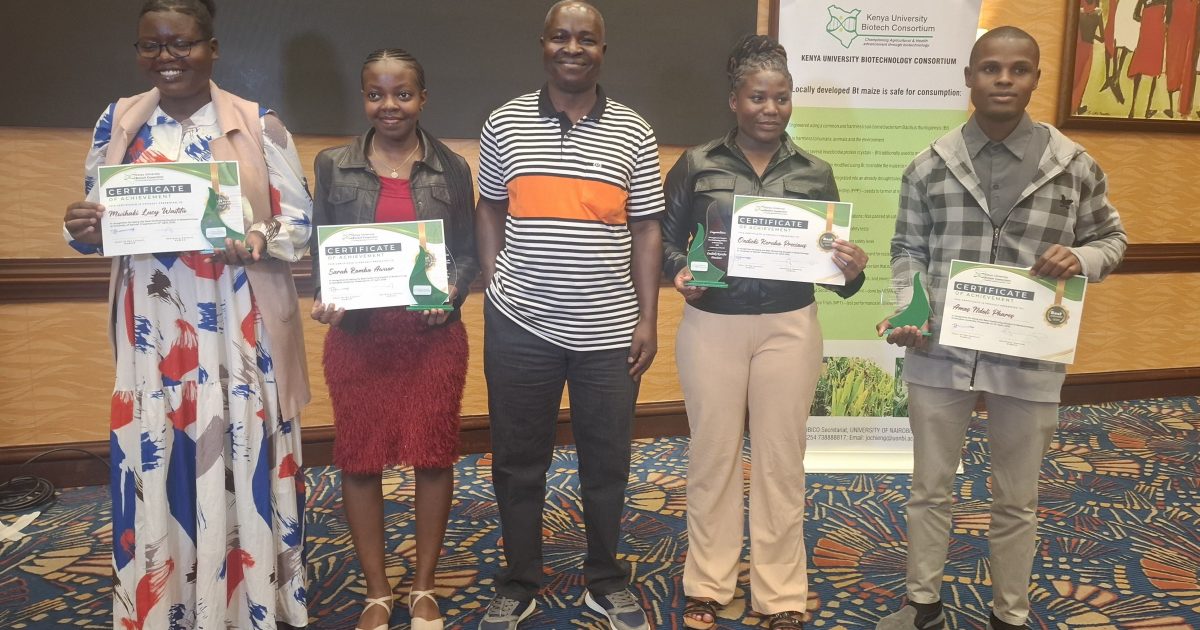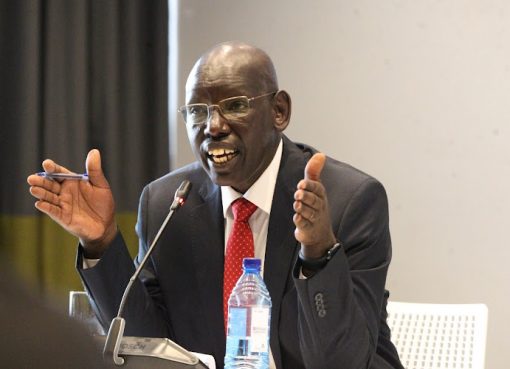University students undertaking biotechnology courses were yesterday awarded for excelling in their studies.
Each of the participating students from University of Nairobi and Kenyatta University received a certificate, trophy and a cash reward from the Kenya University Biotechnology Consortium (KUBICO) for their competence.
Speaking during the award ceremony, the Registrar in-charge of Research at Kenyatta University Prof. Richard Oduor said they were seeing new innovations coming into play in the 21st century and thus it was imperative to celebrate young upcoming scientists
“We are seeing the future of biotechnology escalating from what it is currently viewed as to higher heights and we are encouraging the young people who are in this field to strive and start appreciating the emerging climate,” he said.
Prof. Oduor, who is also a professor of molecular and cell biology, added that for a long time, the discussions around biotechnology have always been advanced by top older scientists, but it was now time that the youth, given their ability to access social media, are given a platform to penetrate.
He promised that going forward, KUBICO would aggressively engage the young people in different aspects of biotechnology, including the dissemination of their work through a forum that would fit within the KUBICO youth section.
During the meeting, Prof. Oduor, however, said that delaying biotechnology innovations such as the GMO any further would see thousands of university students miss out on employment opportunities.
He termed biotechnology as one of the premier courses at the universities that requires high grades and also sees a lot of students being keen and applying for admission in areas of biomedical engineering, informatics, food security and food financing, and even sustainability, and all this fits in with biotechnology.
Prof. Oduor noted that with the numbers increasing, it was now time for more organized discussions around biotechnology, especially with the current debate on GMOs.
Early last month, the Court of Appeal overturned earlier rulings lifting the 10-year ban imposed on the technology, with one NGO, the Kenyan Peasants League, securing a conservatory order stopping the government from taking any further action to permit the importation of GMO crops and food into the country pending determination of their appeal.
“Even as the debate and ban on the technology have been going on, none of the universities have decommissioned their programmes, and we have remained steadfast because we believe in this technology that not only the government is appreciating but also the regulators,” said Prof. Oduor.
He called on the Judiciary to hasten, deal with the matter, and determine the GMO approval case quickly so that some of the products from the technology could be implemented by students who are graduating from the biotechnology courses.
“KUBICO is looking forward to really support government and all universities through advancing the GMO debate and although there is a lot of positivity and determination, what is required is sensitization to the Judicial systems and also the Parliamentarians on the discussion,” he said
The Lead of the Biotechnology Programme at the University of Nairobi and the Secretary General for the Kenya University Biotechnology Consortium Dr. Joel Ochieng said biotechnology is a way to increase food production through new innovations.
“This is one of the sectors that is key to food security for Kenya as you are aware that agricultural progress will depend on manpower as well as human resources and training at the university level and hopefully even before university,” Dr. Ochieng said.
He explained that recognizing the best-performing students taking biotechnology and related courses was key to motivating them and in turn, they could influence the others who were coming behind them to work harder and look at biotechnology as a lucrative area of research and training and assure them of gainful engagement in the future.
Amos Phares, a student at Kenyatta University taking BSc in Molecular and Cell Biology said that biotechnology brings about more benefit than failures and that the misconception and misinformation behind it were derailing biotechnology innovation from thriving.
“If at all we can focus on the benefits that biotechnology can grant us as a country, we would be at par with the rest of the world,” Phares, who was among the best students awarded, said.
Carolyn Mboya, a third-year student and also a student leader in the School of Applied Science and also the congressperson at Kenyatta University, said it was important to sensitize youths on the importance of biotechnology since they were the better channels to go out and talk about it.
Prof. Charles Muleke from Egerton University said the country would not address food security by just producing food using traditional methods.
“We will have to use improved methods that incorporate teaching as a model and learn from the technology. The government should increase funding for biotech courses for sustainable production,” Prof. Muleke urged.
By Wangari Ndirangu




